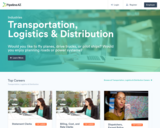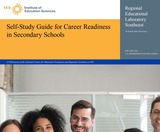
Transportation, Logistics & Distribution
Would you like to fly planes, drive trucks, or pilot ships? Would you enjoy planning roads or power systems? This industry includes careers in planning, management, and movement of people, materials, and goods by road, pipeline, air; rail, and water as well as related professional and technical support services, such as transportation infrastructure planning and management, logistics services, mobile equipment, and facility maintenance. Careers in the transportation, logistics & distribution industry involve moving people and products from one place to another. Most of the occupations in this industry typically require a high school diploma or equivalent for entry. However, specific designations range from less than a high school diploma and short-term on-the-job training for occupations such as taxi drivers and chauffeurs to a bachelor’s degree, less than 5 years of work experience in a related occupation, and moderate-term on-the-job training for airline pilots, copilots, and flight engineers.
- Subject:
- Air Transportation
- Aircraft Mechanics
- Automotive Collision Repair
- Automotive Technologies
- Construction Science Technologies
- Diesel Engine Repair
- Heavy Equipment Operations
- Transportation Technologies
- Material Type:
- Interactive
- Author:
- PipelineAZ
- Date Added:
- 10/29/2020
